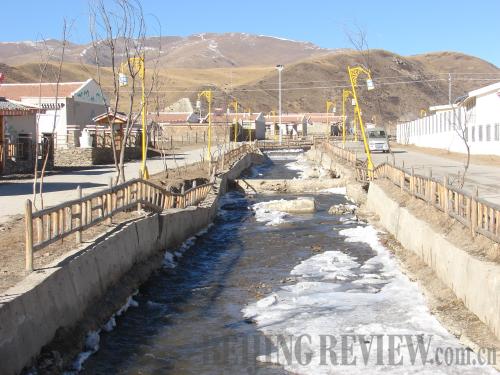|
 |
|
MODERN HOOD: A settlement for Tibetan nomads in Meruma Township in Aba County, Sichuan Province, which provides education and medical care for residents (BAI SHI) |
In winter, the family makes clothes with Tibetan features to earn a living. A traditionally sewn robe can fetch up to 500 yuan ($80) in the market.
Konchuja plans to find additional ways to increase the household income. "I will send my younger daughter to high school, especially since her elder sister missed the opportunity of better education when we lived in the mountains," he explained.
"Children can go to school and elders can receive medical aid. These are two direct benefits of the nomad housing program," said Zalo, a senior researcher at the Beijing-based Institute of Ethnology and Anthropology, Chinese Academy of Social Sciences. He added that the nomad housing program not only improves living conditions, but also provides better public services.
The researcher has closely studied the economic and social conditions of Tibetan-inhabited areas in Sichuan. In his view, the biggest problem facing traditional nomadic life concerns the difficulty of accessing schools and medical services.
"Thanks to the housing program, nomads currently benefit from a comprehensive public infrastructure," Zalo said. "Education is important. Alongside the improvement of schooling, youth now stand a better chance of employment. The program has definitely helped further economic and social development in the area."
In early 2003, China launched its New Rural Cooperative Medical System (NCMS). By 2010, NCMS had covered the entire country, providing nationwide medical security, especially in remote areas. It is reported that NCMS subsidies have increased from 200 yuan ($32) to 240 yuan ($38.51) for each recipient per year since 2012. For newly added funds, state finance makes up 80 percent, including in Sichuan.
Eguo Village in Tanggor has a population of 732, all of whom have access to NCMS. By paying only 60 yuan ($9.63) each, patients are reimbursed 90 percent of expenses when receiving medical care at hospital, headman Tseten Dorje explained.
In addition to education and medical care, employment is a matter of considerable concern among local people and an aspect included within planning of the housing program.
For instance, Eguo is located near the scenic First Bend of the Yellow River. In Sichuan, the Yellow River, China's second longest waterway, flows only here. In recent years, villagers have done a good job in attracting tourists to the area, which boasts an ancient Tibetan Buddha monastery on the river bank.
"While stock farming remains the main village industry, tourism provides us with a bonus," Tseten Dorje said.
Settlement is integral to rural urbanization. Promoting employment and increasing incomes are key priorities in follow-on work, according to Zalo. He called on local governments to make greater efforts to create job opportunities for local herdsmen and offer skills training to further sustainable development.
By the end of 2012, construction of a total of 100,139 houses for the nomad housing program in Sichuan had been completed, 100.88 percent of the original plan. Infrastructure and public services also develop beyond expectation.
Email us at: baishi@bjreview.com | 